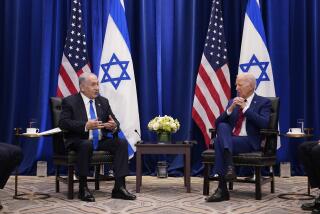Shamir Sees Baker, Cites Threat of Arab Armies
- Share via
WASHINGTON — Prime Minister Yitzhak Shamir, facing growing U.S. criticism of Israel’s occupation of the West Bank and Gaza Strip, sought to change the focus Wednesday from the 15-month Palestinian uprising to the threat posed by the armies of the neighboring Arab states.
Talking to reporters after a 75-minute private meeting with Secretary of State James A. Baker III, Shamir said, “We have discussed together some ways to solve the problem related to the conflict between Israel and the Arab world, including Arab countries and the Palestinian Arabs living in (Israel and the occupied territories).”
Shamir’s spokesman, Avi Pazner, later expanded on the prime minister’s words: “We believe that our most important problem is not the problem that we face inside our country with the Palestinian intifada or uprising . . . the most serious problem that Israel faces is the problem of our relationship with the Arab world which, apart from one country, Egypt, does not recognize us and still finds itself, 41 years after our creation, in a state of war against us.”
Israeli leaders are on much firmer ground in the United States talking about the military threat to their security posed by surrounding Arab states. Although the United States maintains normal diplomatic relations with all Arab nations except Libya and South Yemen, U.S. governments have, for years, pledged to support Israel’s security against any attack that the Jerusalem regime might face.
However, U.S. officials said that President Bush would not be distracted from his concern about the Palestinians’ uprising when he meets Shamir today at the White House.
Bush’s meeting with Shamir, following his meeting earlier this week with Egyptian President Hosni Mubarak, marks the start of the new Administration’s effort to put its own stamp on U.S. Middle East policy.
After his talks with Mubarak, Bush expressed support for Israel’s security but said it was time for the occupation of the West Bank and Gaza Strip to come to an end. Israel has controlled the territories, and the 1.7 million Palestinians who live there, since the Israeli army occupied them during the 1967 Middle East War. Before 1967, the West Bank was controlled by Jordan and the Gaza Strip by Egypt, but those countries have since renounced rights to them, maintaining that the territories should become an independent Palestinian state.
In his comments to reporters after his meeting with Baker, Shamir said he brought some ideas for a possible peace settlement. But neither Israeli nor American officials would say what those ideas were before Shamir’s meeting with Bush.
“The prime minister has made some suggestions,” Baker said. “We are going to continue our discussion with the objective of moving the peace process forward, if it’s possible to do so. They were very encouraging. Hopefully they will form the basis under which we can move the peace process forward.”
Although Pazner declined to discuss the content of Shamir’s meeting with Baker, he confirmed that the prime minister is ready to call for elections in the West Bank and Gaza Strip once the violence of the uprising ends. Pazner implied that the election plan was central to Shamir’s proposals, but he refused to say if there was more to the plan than that.
Shamir outlined his policies in a speech Tuesday night to Jewish leaders in New York. In that speech, he insisted that Israel will never agree to a peace treaty requiring surrender of the West Bank and Gaza, will never participate in an international conference including countries from outside the region and will never negotiate with the Palestine Liberation Organization.
Shamir’s position is at variance with U.S. policy on all three points. Bush supports the land-for-peace formula and he has said that a “properly structured” international conference could help to advance the peace process. Baker has said that Israel should not totally close the door to possible negotiations with the PLO.
However, Seymour D. Reich, president of B’nai B’rith International and chairman of the Conference of Presidents of Major American Jewish Organizations, issued a statement supporting Shamir’s remarks to the New York meeting.
“We have always believed that the people of Israel themselves, as represented by their democratically elected leaders, must ultimately decide what is in their vital national interest,” Reich said.
More to Read
Sign up for Essential California
The most important California stories and recommendations in your inbox every morning.
You may occasionally receive promotional content from the Los Angeles Times.













